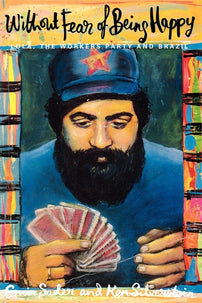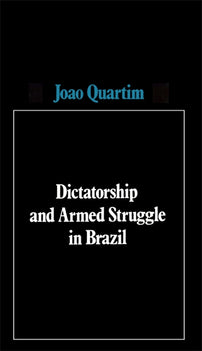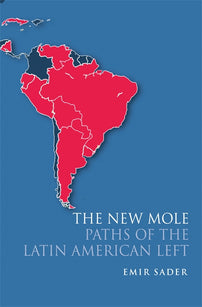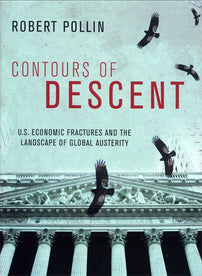The Problem of Corruption, Lula, and Us
Anti-corruption discourse in Latin America has acted to protect the system, as a substitute for class struggle.

First published at Lobo Suelto!. Translated by Liz Mason-Deese.
I wish we were in conditions to create alternative media! We’ll get there eventually, I believe. But you have to understand that we are in Brazil and not in Europe. It’s another universe, another political education, another experience of struggle! But I think that we will get to that situation, because it is the only way to free ourselves from dependence on the official media. — Ignacio Lula da Silva, 1982
The Perestroika of Capital
Corruption is a phenomenon of perversion or devaluation that, in reference to public life, becomes an ethical or political problem of the first order. To look at the recent history of the use of anti-corruption discourse by those who regulate the mechanisms of social control and accumulation we need to go back to the Menemism of the 1990s. At the end of the Cold War, the business, political, and religious elite, along with the communications apparatus, understood the convenience of resolving their internal disputes within a discursive space that did not question the fundamental lines of the triumphant socioeconomic system. Anti-corruption discourse acted to protect the system and replace class struggle in a context in which the threat of coup by the old military party started to lose force. Moral values and the legal code became the ultimate foundation of the political, annihilating the real substance of democratic practice. As if Machiavelli had not taught us anything about the extra-moral reality of politics. Since then, the rotation of political personnel has been settled by means of accusations, with or without proof, of crimes and embezzlement. We see it today in Brazil, in Ecuador, Peru, and in Argentina. It is that simple. The so-called progressive governments, almost all of whom emerged as the effects of the cycle of social struggles between 1996 and 2003, are being wiped off the map by this procedure, which was initially designed to resolve the internal troubles of those who rule.
Robbing for the Crown
Thus there is a clear need for a political thought that is critical of that discourse focused on denouncing corruption. In an initial and aerial review of some things that have already been stated and written about the issue, the following points of departure could be considered:
1. Corruption of democracy. After the crisis caused by debt in the 1980s, and lasting until the crisis of the end of the 1990s, local elites reached an agreement with the global creditors on a mode of capturing collective surplus value through the state: privatizations, bonus festivals, etc. These function as mechanisms for transferring public resources to the large economic groups and international credit agencies. During that time, corruption was a class resource oriented toward situating the state as an instrument of social exploitation and as internal compensation between factions of the ruling class block. This process of dispossession was carried out in full democracy, by hijacking popular representation. Corruption thus became an indispensable mechanism for the misappropriation of the decision-making process to the benefit of large capital and caused the sterilization of the democratic potential of the rule of law and the parliamentary system.
2. Corruption of communitarian forms. If we go beyond a focus on political modes, neoliberalism is a way of corrupting communal forms of life. Enzo Traverso refers to neoliberalism directly as an “anthropology.” It is a regime for managing the processes of individuation that blocks and assaults all figures of collective power that are not functional to the entrepreneurial hero. As anthropologist Rita Segato explains (and as the March 8 Women’s Strike movement foregrounds), the violent penetration of this neoliberal subjectification can only be reversed if political bodies — institutions, governments, states — were returned to a popular communitarian jurisdiction.
War Against Democracy
The discourse against corruption and in favor of a republic of capital is posed as a war against democracy (even against the republic that, in a classic sense, is an indissoluble effort to liquidate the power of the party of the rich over the public). Its principle apparatuses are, according to a brief text by Hardt and Negri — Declaration — processes of the mediatization of perception, representation of the political, securitization of life, and indebtedness or the subordination of social cooperation through finance. Private property is the foundation coordinating these four apparatuses that produce individuals devoid of social bonds. Without a critique that goes to the root of this complex machinery, it is impossible to understand how the phenomena of cruelty in neoliberal society are constituted, nor the strategic importance that anti-corruption discourse takes on as a way of delegitimizing any figure of the collective that is formed based on principles that are different from and in opposition to those of neoliberalism.
Destroy Lula!
To destroy Lula is to destroy the pioneering and systematic effort to create a new left based on social movements following the fall of the Soviet Union. Grassroots ecclesial communities, movements of landless campesinos, the powerful metalworkers’ unionism, the intellectuals who had resisted the dictatorship: the PT was formed as a non-Stalinist, mass-based political expression capable of convoking and inspiring social struggles across the continent. And it did so under the powerful leadership of a man born into the poverty of Northeast Brazil, himself a metalworker and union leader. It is true that Lula and the PT distanced themselves greatly from that effort when, once in government, they took pains to transform the novelty of this left into a friendly (and very celebrated) attitude in forums such as that of Davos. On the other hand, during those years the left made numerous criticisms of the PT and much of the left distanced itself from the party. In fact, the PT governments implemented neoliberal policies and repressed, in an absolutely unforgivable way, the movements that came out for free transportation and other demands in 2013. It is essential to fully understand the PT’s limits on these fundamental issues, for which we can turn to Toni Negri’s recent dialogue with important party cadres. Despite all of this and due to the historical role that they played both at the national level and the continental level, Lula and the PT continue being an obstacle for the most powerful bourgeoisie on the continent. Destroying Lula, in this precise historical moment, is to liquidate any possible democratic articulation between institutions and popular movements.
The Perfect Crime
The neoliberal regime — that of unbridled capital and its operators — feels capable of carrying out an improbable perfect crime; it has too much confidence in the inactivity of the plebeian floor that acts from below and beyond parties and governments. But perhaps everything could be seen in the opposite way if we start from the movements of the landless, the homeless, the inhabitants of the peripheries, and the women’s movement, that ongoing molecular movement that liberals and conservatives are allied in opposition to, which have created a crisis in the democratic political space in which conflicts have been resolved up to now. As the psychoanalyst Suely Rolnik wrote recently, it is out of these explosive components that new strategies of resistance will emerge.
#FreeLula
Diego Sztulwark is based in Buenos Aires. He is involved with the publisher Tinta Limón, regularly blogs for Lobo Suelto, and participates in the Instituto de Investigación y Experimentación Política (IIEP). He was a member of the militant research collective Colectivo Situaciones.
[book-strip index="1" style="display"]



